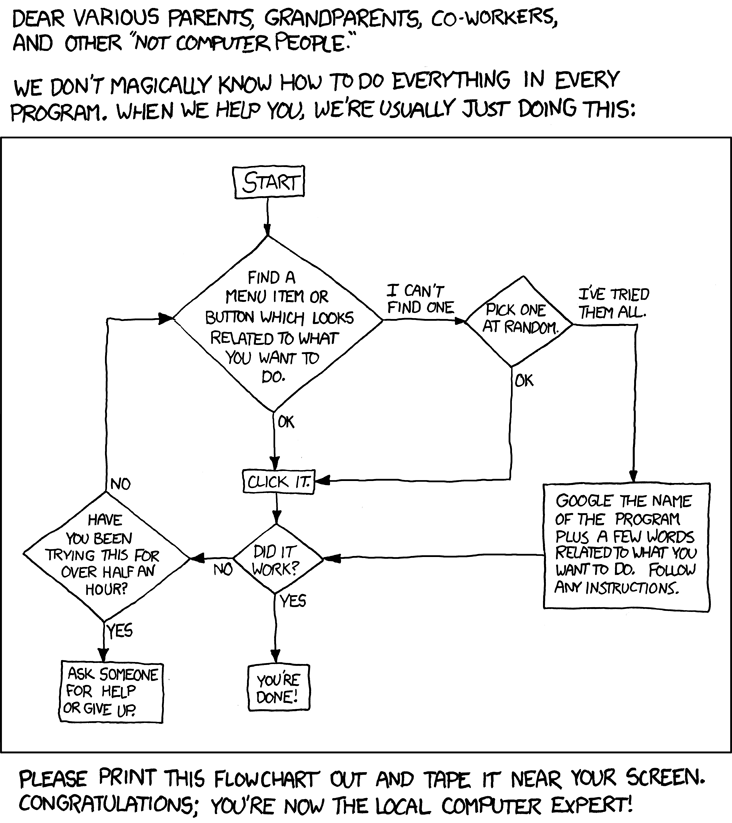I love xkcd!
Tech Support Cheat Sheet:

Month: August 2009
Record cherry crop will be left on trees – UPI.com:
TRAVERSE CITY, Mich., Aug. 22 (UPI) — Tart cherry farmers near Traverse City, Mich., and in six other states are as sour as their fruit over a mandate they must not harvest the whole crop, one said. Rob Manigold, one of the Michigan farmers who grow 75 percent of the sour cherry crop in the United States, said it could be a record year, The Wall Street Journal reported.
Growers in Michigan, New York, Pennsylvania, Oregon, Wisconsin, Utah and Washington are expecting a bumper crop of about 284 million pounds of sour cherries, but were told by fruit processors to leave up to 40 percent unharvested.
A Depression-era federal marketing program has regulated sour cherry growing since 1933. The program, designed to keep prices from dropping, will keep the fruit rotting in orchards instead of in cherry pies.
Between the failing economy and increasing health consciousness, the demand for desserts has dropped. Sour cherries are generally not eaten raw, but are used in pies and other desserts.
In other stupidity news, the USDA still maintains a quota on sugar imports, ensuring that the price US consumers pay for sugar is much higher than the rest of the world.
More Evidence That We’re All Getting Richer:
Steve Horwitz
While looking for something else, I stumbled across this Census report on household income from 2006. What’s really interesting is to look at the percentage of households in each income category and how that’s changed over time. If the prophets of doom and decline and rising inequality are right, we would expect to see, I’d think, lots more rich households and lots more poor ones as the supposed gap widens. Some prophets of doom might expect to see fewer households in the upper brackets as the highest income categories are dominated by a few people getting very, very rich.
The reality, as it turns out, is different. From 1980 to 2006, the percentage of US households earning $100,000 or more (in constant 2006 dollars) grew from 8.6% to 19.1%. The percentage between $75k and $100K grew from 10.3 to 11.3 percent. At the other end, the percentage under $15K fell from 16.6% to 13.4% and the percentage between $15K and $34K fell from 26.2% to 23.3%. Thus all three categories below $35K fell a total of 6.1 percentage points.
The middle classes fell too, though by less. The sum total across the $35K to $75K categories fell by 5.4 percentage points. In other words: the net movement of households was an 11.5 percentage point gain in households above $75K and a net reduction of 11.5 percentage points in houses below $75K. So the percentage above $75K rose from 18.9% to 30.4%. That is, it increased by over 50%.
Let me repeat that: over 30% of US households in 2006 earned above $75K compared to under 20% in 1980. Over the same period, the percentage of US households earning under $35K fell from 42.8% to 36.7%. Fewer households are poor, fewer are middle class, and a hunk more are above $75K. (And in case you were wondering, those general trends hold for black and hispanic households too – with the percentage of black households under $35K falling by 10.9 percentage points and the number above $75K increasing by 8.9 percentage points, for example.)
Throw on top of this the fact that most everything people buy costs less in real terms and you have a recipe for increasing wealth across the board. Not bad for what so many people claim is 30 years of stagnation.
The way to avoid the maddening convulsions of politics isn’t to change them, or rise above them, or move past them, or transform them, or whatever the trendy term of art is on any given day. It’s to avoid them—and reduce their power to hold sway over how we live. And the more decisions about our lives and welfare we put in the hands of politicians, the harder that will be to do.
Something Is Happening Here, But You Don’t Know What It Is…:
Seems to me the media accounts of this story are missing the point. Yes, it’s amusing and a bit surreal to picture Bob Dylan wandering around a local neighborhood near where he’s giving a concert. But now everyone’s having a good laugh about how two local police officers had no idea who Dylan was when they stopped and detained him after some residents reported an elderly man acting “suspiciously.”
I don’t know. I find it pretty depressing. There was a time when we condescendingly used the term “your papers, please” to distinguish ourselves from Eastern Block countries and other authoritarian states. Post-Hiibel, America has become a place where a harmless, 68-year-old man out on a stroll can be stopped, interrogated, detained, and forced to produce proof of identification to state authorities, despite having committed no crime.
I guess I just don’t see the punchline.